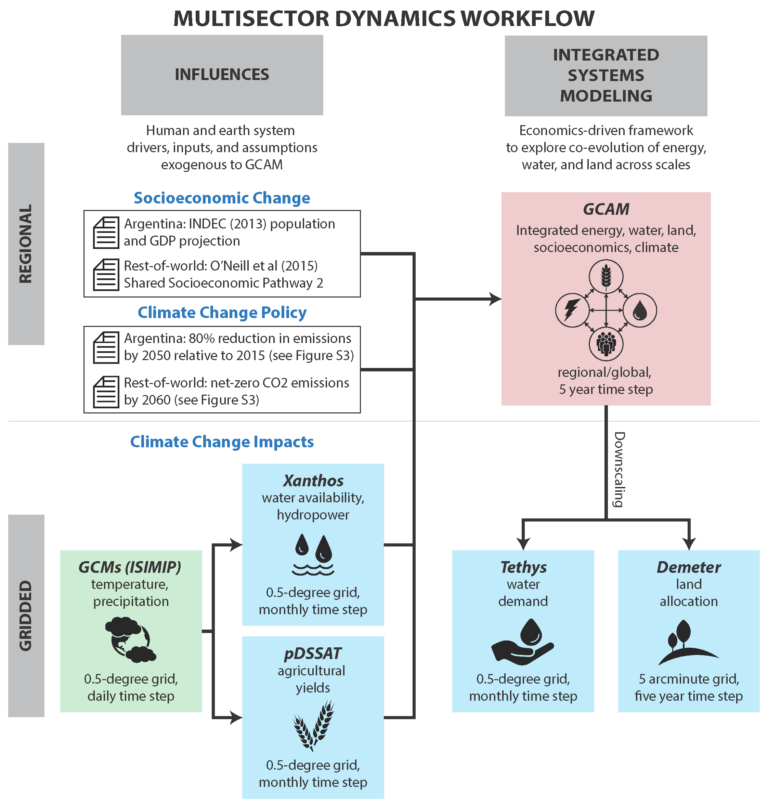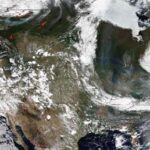
Several ESSIC scientists including Thomas Wild, Mengqi Zhao, Fernando Miralles-Wilhelm, and Brinda Yarlagadda are credited on a new paper titled, “The Implications of Global Change for the Co-Evolution of Argentina’s Integrated Energy-Water-Land Systems”.
This study seeks to understand how Argentina’s energy, water, and land (EWL) systems will coevolve under a representative array of human and earth system influences, including socioeconomic change, climate change, and climate policy. To capture Argentina’s sub-national EWL dynamics in the context of global change, they coupled the Global Change Analysis Model with a suite of consistent, gridded sectoral downscaling models to explore multiple stakeholder-engaged scenarios.
Across scenarios, Argentina has the economic opportunity to use its vast land resources to satisfy growing domestic and international demand for crops, such as oil (e.g., soy) and biomass. The human (rather than earth) system produces the most dominant changes in mid-century EWL resource use. A Reference scenario characterized by modest socioeconomic growth projects a 40% increase in Argentina’s agricultural production by 2050 (relative to 2020) by using 50,000 km2 of additional cropland and 40% more water. A Climate Policy scenario designed to achieve net-zero carbon emissions globally shortly after mid-century projects that Argentina could use 100,000 km2 of additional land (and 65% more water) to grow biomass and other crops.
Argentina serves as a generalizable testbed to demonstrate that multi-scale EWL planning challenges can be identified and managed more effectively via integrated analysis of coupled human-earth systems.
Wild is also jointly appointed as a Research Scientist at the Pacific Northwest National Laboratory’s Joint Global Change Research Institute. His background is in systems analysis and hydrology, with a focus on developing and applying novel modeling tools and decision support frameworks for solving complex systems problems that occur at the intersection of disciplines. His research has focused on water resources and environmental systems, and has contributed to identifying and mitigating food-energy-water tradeoffs and conflicts, developing sustainable hydropower systems, managing fluvial and stormwater quality, and equitably sharing transboundary resources.
Fernando Miralles-Wilhelm is a hydrologist and water resources engineer who conducts research on water, sustainability and climate. He has worked on problems related to surface water and groundwater; physical, chemical and biological processes in aquatic ecosystems; climate-hydrology-vegetation interactions in ecosystems; water resources management in urban and agricultural watersheds; stormwater management; and water quality control.
Mengqi Zhao is a postdoctoral associate at the Earth System Science Interdisciplinary Center (ESSIC) at the University of Maryland. Her research focuses on using integrated assessment model and interactive tools to gain insight on socioeconomic and environmental impacts on food, energy, and water resources across multiple spatial scales. Her work also includes assessing the effects of land use change on hydrologic patterns at basin scale, evaluating adaptive water resources management for sustainable development, and system dynamics analysis.
Brinda Yarlagadda is a PhD student in the School of Public Policy at the University of Maryland. Her research is focused on modeling of institutional drivers on food-energy-water nexus systems across scales in Latin America.
To access the paper, click here: “The Implications of Global Change for the Co-Evolution of Argentina’s Integrated Energy-Water-Land Systems”






